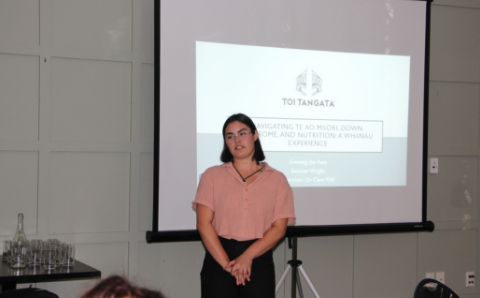
14 May Navigating Māori, Down Syndrome, and Nutrition in Tāmaki Makaurau
Summer Wright (Ngāti Maniapoto) Post Grad Nutrition student received a joint venture Toi Tangata and University of Auckland, Growing the Puna internship. Summer’s passion and experience of working alongside whanau living with disabilities was an area in which Toi Tangata was very interested to explore.
Summer undertook a project to determine what nutrition related support and services are available for rangatahi Māori with Down Syndrome. The title of her mahi was ‘Navigating Māori, Down Syndrome, and Nutrition in Tāmaki Makaurau.’
Summer reported that “surprisingly, given the nutritional challenges Down Syndrome rangatahi Māori whanau live with, my investigations with Health and Disability agencies and interviews with key informants and whanau members revealed that there are no specific nutrition services are available to this group.”
Summer’s research also highlighted that in general there also appear to be major gaps in the provision of nutritional support for Māori with disabilities.
Another key finding is that there are no official disability accreditation pathways available to nurses or other health professionals in New Zealand. This means that those working with whanau with disabilities do not receive competency training and might not be well equipped to provide the best care. Whanau consultation revealed that while parent support groups would be a great resource, there are no maori-led networks for down syndrome. Te Roopu Waiora is one kaupapa maori disability organisation that provides disability information and advice, and assists whanau access Māori communities, providers, agencies and government.
Also, whanau might be reluctant to access ‘disability services’ because of a perceived deficit labelling of these services and that they may negatively flag their family member who has a disability.
From interviews with health professionals, Summer said “there appeared to be a reluctance from some health professionals to refer to or suggest te reo Māori resources for clients with disabilities.” There are a number of reasons for this and a solution from one of the health professionals was a request for Summer to assist in the development of a suitable Māori nutrition resource which all health workers would be able to use.
In conclusion
Summer recommends future projects to determine what supports are needed and how they can be effectively implemented for Down Syndrome rangatahi Māori and their whānau. She also suggests that interventions in this area might be helpful for whanau:
Parent support networks
Increased disability competency within the health sector with disability training
Nutritional resources for families of rangatahi maori with down syndrome
References
Allen, E. G., Freeman, S. B., Druschel, C., Hobbs, C. A., O’Leary, L. A., Romitti, P. A., … Sherman, S. L. (2008). Maternal age and risk for trisomy 21 assessed by the origin of chromosome nondisjunction: a report from the Atlanta and National Down Syndrome Projects. Human genetics, 125(1), 41–52. doi:10.1007/s00439-008-0603-8



